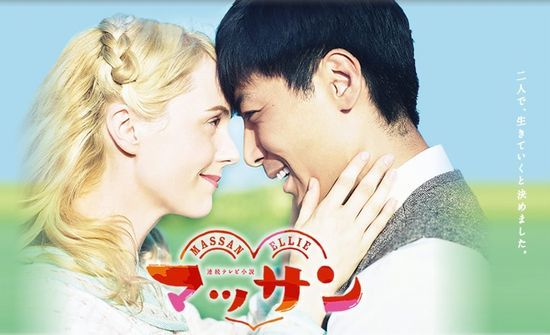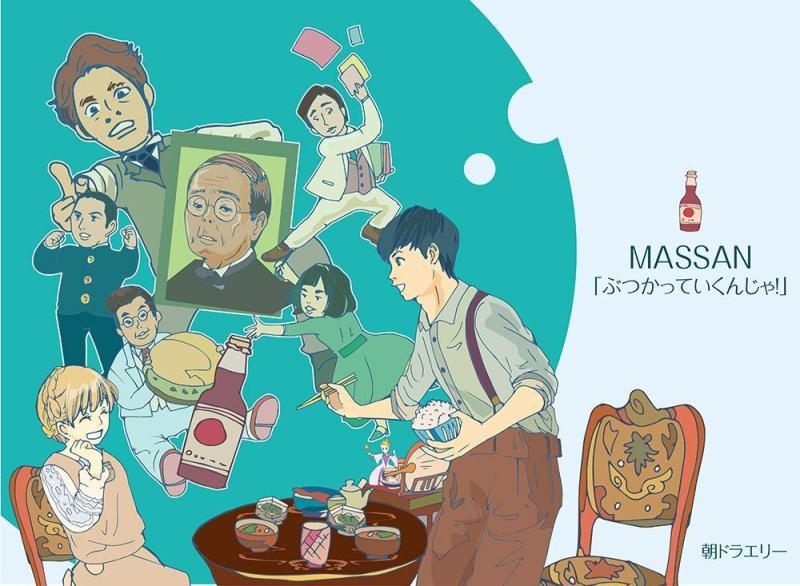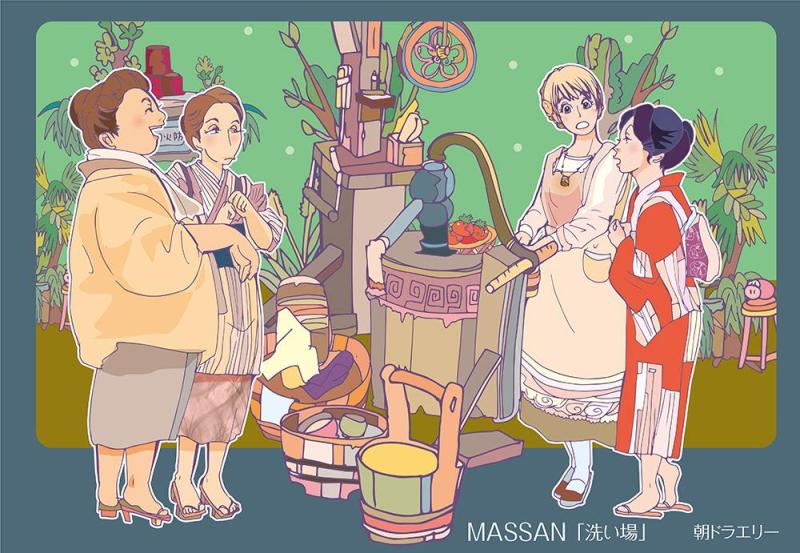
Image Courtesy of Sachi’s blog
When I heard about the newest show to premiere on NHK, “Massan,” was all about the trials and hardships of a marriage between a white woman and a Japanese male, I was a bit skeptical. I was afraid the show would be another ridiculous showcase of stereotypes about foreigners. The advertisement revealed a blonde hair, blue-eyed woman frolicking around the fields of Scotland with an attractive Japanese man running to embrace her.
Oh god, I thought.
This is going to be another repeat of My Darling is a Foreigner.
Instead, I was pleasantly surprised.
Go ahead, call me a wimp, but after I researched the show and actually watched a few episodes—I was holding back tears.
I think the show struck a particularly deep chord with me because…
It’s a True Story
 Courtesy of The Guardian
Courtesy of The Guardian
When I read the synopsis for this story, I thought to myself: This is BS, no foreign woman from the early 1900s would marry a Japanese man and run off to Japan.
But my god, she really did.
You know Suntory whiskey? Japan can thank Masataka Taketsuru (Massan in the drama) for the gem that is Suntory Whiskey. Taketsuru-san’s life was changed forever after his first sip of whiskey in Japan. He boarded a boat in the early 1900s, sailed the seas to Scotland, and learned how to brew quality whiskey while snagging a hot Scottish babe, Rita Cowan (Ellie in the drama). Since he was too poor to afford rent, he rented out a room in the Cowan household and taught the family Judo.
I guess he woo’d Rita with all of his martial arts moves, because he was able to convince her to get on a boat and leave Scotland forever and move to Japan in 1920. I want to make great Scottish whiskey in Japan, he told her, and she said “and I’ll be there to support you.” Both families opposed the marriage.
After successfully helping Japan launch its whiskey industry (aka Suntory), he and Rita moved from Osaka to Yoichi in Hokkaido because the terrain was similar to Rita’s homeland of Scotland. They started a new whiskey distillery there called Nissa, and lived out the rest of their years in Hokkaido.
Using the last of her inheritance, Rita opened a children’s nursery in Hokkaido.
Rita passed away in 1960 and was buried with her husband.
In that small town of Yoichi you can find a street in remembrance of Rita Cowan.
You can still walk down “Rita Road” in Yoichi today.
For more background, check out a recent article by The Guardian about their trials and tribulations.
The Struggles of AMWF

Image Courtesy of Sachi’s blog
AMWF: In other words, the very small community of “Asian Male White Female” relationships.
As it is heatedly debated on the net, the AMWF circle is small. While we see many white males dating Asian females, we rarely see the opposite. I can count on my fingers how many AMWF relationships I have seen in both China and Japan.
In other words, we stick out. In Asia I was used to having fingers pointed at me or hearing the words “foreigner foreigner!” shouted at me.
But if I was walking arm-in-arm with an Asian man?
It felt like the whole country stopped to stare.
International relationships have a slew of problems, and dealing with my past Asian boyfriends and family was, to put bluntly, traumatizing. The disapproving parents, the cultural clashes, the feeling of being thrown into a pool of water and expected to swim, constantly asking myself: what should I do, what should I say, what will they think?
And to imagine that Rita (Ellie in the show) went through all of this back in the early 1900s is absolute madness. I can barely handle living in Japan in the 21st century, but living relocating there permanently in 1920s with a Japanese husband?
I can’t even fathom it.
People were still wearing kimonos then. At that time I bet most of Japan never heard of Scotland, much less seen a foreigner. She said goodbye to her entire life in Scotland, never looked back, and strode forward with her husband until the very end in Hokkaido.
If that’s not true love, I don’t know what is.
The Show Itself

Image Courtesy of Sachi’s blog
Sure, the foreign stereotypes in Massan run rampant—but it was the Taisho era, and I’m quite positive that back then foreigners had yet to use chopsticks and were completely blown away by the concept of taking shoes off before entering a home.
The director chose an American actress that speaks zero Japanese to play Ellie in the drama. While picking a fluent ex-pat seems like the better decision, I think the choice in picking a complete ‘newb’ was the right one.
She’s struggling with the language. Her Japanese sounds funny. Everything about Japan is alien and unfamiliar–yet she dives in head first with a smile and embraces the opportunity. In Ellie, I see a woman charging blindly forward into a foreign country in order to better understand the man she loves. I see her struggling to deal with her in-laws. I see her walking on eggshells and treading dangerous waters in order to be accepted, yet is rejected time and again. I see her raw and honest passion to support her husband and his dream, and he also reciprocating that love.
In Ellie, I see myself.
The acting isn’t the greatest, the stereotypes run rampant, and sometimes I just can’t understand Ellie’s Japanese—
But Massan is a rare, and most importantly true story about how love can really overcome cultural boundaries and flourish.
I have no idea where you can find Massan, but if you would like to find out more information about the show you can visit the show’s Japanese homepage here. Massan is NHK’s latest ongoing morning show broadcast everyday for 15 minutes.
(PS Unlike Legal High and Hanzawa Naoki, this drama is definitely not a good pick for learning Japanese. Not only is Ellie’s Japanese extremely difficult to understand, but Massan and his entire family speak with a thick Hiroshima accent. I gotta give Ellie credit, she doesn’t just have to learn Japanese—she has to understand gangsta Hiroshima-ben!)



